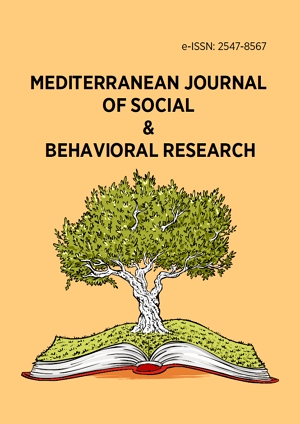Research Article
The Study of the Opinions of the Teachers Working in the Field of Special Education towards their Level of Burnout and Life Satisfaction (TRNC Sample)
More Detail
1 Karabuk Mehmet Mescier Private Education Job Application Center, Karabuk, TURKEY2 Cyprus International University, Faculty of Education, Department of Special Education, Haspolat, CYPRUS3 Vice-Chancellor, American University of Cyprus, Nicosia, CYPRUS* Corresponding Author
Mediterranean Journal of Social & Behavioral Research, 1(2-3), December 2017, 73-82, https://doi.org/10.30935/mjosbr/8380
Published: 20 November 2017
OPEN ACCESS 1075 Views 655 Downloads
ABSTRACT
The aim of this study is to examine the perceptions of special education teachers on their burnout levels and life satisfaction. In this research, Maswlach Burnout Scale (MBS) and Life Satisfaction Scale (LSS) were used. The population of the study involves 67 special education teachers (35 female and 32 male teachers) who are employed in elementary schools governed by the Ministry of National Education System in Turkish Republic of Northern Cyprus. These schools have special education centers and resource rooms. The findings showed that there are significant differences between the burnout levels of the teachers in terms of their age, their status of working and not working with a specific group of people with disability. The findings also revealed significant differences between their life satisfaction and their field of study. In addition, a perfect negative correlation was found between the participants’ scores of MPS and LSS.
CITATION (APA)
Ozturk, O., Piskin Abidoglu, U., & Ertugruloglu, O. (2017). The Study of the Opinions of the Teachers Working in the Field of Special Education towards their Level of Burnout and Life Satisfaction (TRNC Sample). Mediterranean Journal of Social & Behavioral Research, 1(2-3), 73-82. https://doi.org/10.30935/mjosbr/8380
REFERENCES
- Acar Arasan, B. N. (2010). Akademisyenlerde yaşam doyumu iş doyumu ve mesleki tükenmişlik düzeylerinin belirlenmesine yönelik bir araştırma [A research on the determination of life satisfaction, job satisfaction and professional burnout levels among academicians] (Unpublished Masters Thesis), Usak University, Institute of Social Sciences, Turkey.
- Akcamete, G., Kaner, S., & Sucuoglu, B. (2001). Öğretmenlerde tükenmişlik iş doyumu ve kişilik [Burnout job satisfaction and personality in teachers]. Ankara, Turkey: Nobel Publishing & Distribution.
- Aydemir, H. (2013). Özel eğitim alanında çalışan öğretmenlerin tükenmişlik düzeyleri ve yaşam doyumlarının incelenmesi (Unpublished Masters Thesis), Abant Izzet Baysal University, Turkey, Institude of Education Sciences, Turkey.
- Capa, Y., & Cil, N. (2000). Öğretmen adaylarının öğretmenlik mesleğine yönelik tutumlarının farklı değişkenler açısından incelenmesi [Investigation of prospective teachers’ attitudes towards teaching profession in terms of different variables]. H.Ü. Eğitim Fakültesi Dergisi, (18), 69-73.
- Ergin, C. (2001). Sağlık personelinin iş anlayışları ve tutumları araştırması. Sağlık Dergisi, 3, 1-16. Retrieved from http://sbu.saglik.gov.tr/Ekutuphane/kitaplar/200702131615140saglikkitap.pdf
- Gulcan, A. (2014). Genç yetişkinlerde iyimserliğin mutluluk ve yaşam doyumu üzerindeki etkisinin incelenmesi (Unpublished Masters Thesis). Fatih University, Institude of Social Sciences, Turkey.
- Gunduz, B. (2006). Öğretmenlerde tükenmişliğin akılcı olmayan inançlar ile bazı meslek ve kişisel değişkenlere göre yordanması [Predicting burnout among teachers with irrational beliefs and some occupational and personal variables]. Türk Psikoloji ve Danışma Rehberlik dergisi, 3(26), 17-33.
- Karahan, S. (2008). Özel eğitim okullarında çalışan eğitimcilerin öz yeterlik algılarının ve tükenmişlik düzeylerinin incelenmesi (Unpublished Masters Thesis), Marmara University, Institude of Education Sciences, Turkey.
- Oruc, S. (2007). Özel eğitim alanında çalışan öğretmenlerin tükenmişlik düzeylerinin bazı değişkenler açısından incelenmesi (Adana ili örneği) (Unpublished Masters Thesis), Cukurova University, Institude of Social Sciences, Turkey.
- Yegin, H. I. (2014). Din kültürü ve ahlâk bilgisi öğretmenlerinin tükenmişlik düzeyleri. Ekev Akademi Dergisi, 18(58), 315-332. Retrieved from http://www.ekevakademi.org/DergiTamDetay.aspx?ID=211&Detay=Ozet

 The articles published in this journal are licensed under the CC-BY Creative Commons Attribution International License.
The articles published in this journal are licensed under the CC-BY Creative Commons Attribution International License.